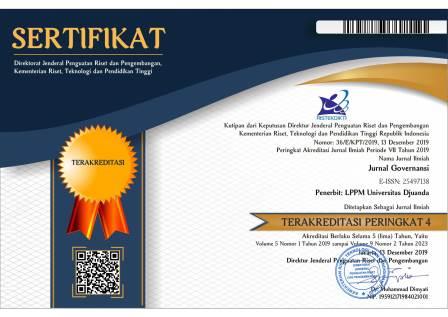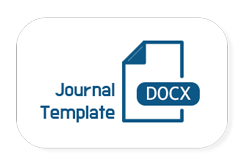THE EFFECT OF COMPENSATION ON THE PERFORMANCE OF EMPLOYEES IN PROTOCOL, COMMUNICATION AND ADMINISTRATION OF LEADERS IN THE REGIONAL SECRETARIAT
DOI:
https://doi.org/10.30997/jgs.v9i1.5460Keywords:
Compensation, Employe, PerformanceAbstract
The research conducted in the study focuses on the impact of compensation (X) on the performance (Y) of employees in the Protocol, Communication, and Administration division of the Regional Secretariat of Sukabumi City. Compensation was evaluated using Rivai's Theory (2018: 357), which includes direct financial compensation, such as salaries and incentives, and indirect compensation, such as allowances and facilities. On the other hand, performance was measured using Mangkunegara's Theory (2015: 68) based on three dimensions: quality, quantity, and responsibility. The research method employed was an associative method using a quantitative approach, and the data was collected through questionnaires and interviews. The sample size used in the research was obtained through a saturated sampling technique, and SPSS (Statistical Product and Service Solutions) 26 was used for data analysis. The data was analyzed to determine its validity, reliability, correlation coefficient, and the extent to which compensation affects employee performance through linear regression analysis. The findings of the analysis revealed a strong relationship between compensation and employee performance, with a correlation coefficient of 0.943 and a coefficient of determination of 88.92%. Based on the results, the hypothesis that compensation has a positive impact on employee performance in the Protocol, Communication, and Administration division of the Regional Secretariat of Sukabumi City was accepted. Therefore, the study concludes that compensation has an optimal impact on employee performance, and there is a positive relationship between compensation and employee performance in this division.
References
Adhiyaksa, Fanji. 2020. Pengaruh Kompensasi Terhadap Kinerja Pegawai Badan Kepegawaian dan Pengembangan Sumber Daya Manusia (BKPSDM) Kota. Tasikmalaya: Sekolah Tinggi Ilmu Administrasi YPPT Priatim.
Hasibuan, M. S. (2016). Manajemen Sumber Daya Manusia. Edisi Revisi. Penerbit PT Bumi Aksara.
Mangkunegara, A. A. A. (2019). Manajemen Sumber Daya Manusia Perusahaan Cetakan Kedua. PT. Remaja Rosda karya Offside.
Rivai, V. (2013). Manajemen Sumber Daya Manusia Untuk Perusahaan Dari Teori Ke Praktek. Rajagrafindo Persada.
Sedarmayanti. (2017). Manajemen Sumber Daya Manusia. Refika Aditama.
Sugiyono. (2018). Prof. Dr. Sugiyono. 2018. Metode Penelitian Kuantitatif, Kualitatif, dan R&D. Bandung: Alfabeta.
Sugiyono. Prof. Dr. Sugiyono. 2017. Metode Penelitian Kuantitatif, Kualitatif dan R&D. Bandung Alfabeta, CV.
Sugiyono. Prof. Dr. Sugiyono. 2018. Metode Penelitian Kuantitatif. Bandung: Alfabeta.
Keputusan Walikota Sukabumi Nomor 188.45/31 – BPKD /2019 tentang pemberian tambahan penghasilan pegawai berbasis kerja bagi pegawai di lingkungan Sekretariat Daerah Kota Sukabumi.
Peraturan Walikota No 52 Tahun 2018 tentang mekanisme pemberian tambahan penghasilan pegawai berbasis kerja bagi pegawai negeri sipil di lingkungan Sekretariat Daerah Kota Sukabumi.
Downloads
Published
How to Cite
Issue
Section
License
Copyright (c) 2023 Rosi Pitria, Tuah Nur, M. Rijal Amirulloh

This work is licensed under a Creative Commons Attribution-ShareAlike 4.0 International License.
Authors who publish with Jurnal Governansi agree to the following terms:
- Authors retain copyright and grant the journal right of first publication with the work simultaneously licensed under a Creative Commons Attribution 4.0 International License that allows others to share the work with an acknowledgement of the work's authorship and initial publication in Jurnal Governansi.
- Authors are able to enter into separate, additional contractual arrangements for the non-exclusive distribution of the journal's published version of the work (e.g., post it to an institutional repository or publish it in a book), with an acknowledgement of its initial publication in Jurnal Governansi.
- Authors are permitted and encouraged to post their work online (e.g., in institutional repositories or on their website) prior to and during the submission process, as it can lead to productive exchanges, as well as earlier and greater citation of published work.




















